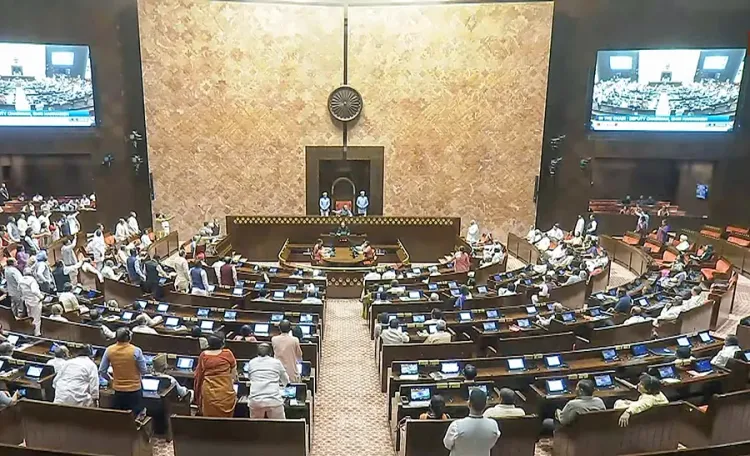Did RS Pass Two Crucial Bills Amidst Opposition Boycott for Tribal Representation in Goa Assembly?

Synopsis
Key Takeaways
- Rajya Sabha passed two key bills aimed at enhancing tribal representation and maritime reform.
- Goa ST Representation Bill seeks to reserve four Assembly seats for Scheduled Tribes.
- The Coastal Shipping Amendment Bill aims to align India with international maritime standards.
- Opposition members boycotted the session, raising concerns over alleged vote theft.
- These legislative changes are crucial for promoting social justice and democratic participation.
New Delhi, Aug 11 (NationPress) In a session characterized by tension and procedural haste, the Rajya Sabha successfully passed two pivotal legislations - the Readjustment of Representation of Scheduled Tribes in Assembly Constituencies of Goa Bill, 2025, and the Coastal Shipping (Amendment) Bill, 2025 - via voice vote, notably without the presence of Opposition members.
The House reconvened at 2 PM under the chairmanship of Surendra Singh Nagar. During a brief moment, Leader of Opposition Mallikarjun Kharge was permitted to address the assembly, claiming that 250 Members of Parliament had participated in a protest against alleged “vote theft.”
This led to strong objections from the treasury benches, resulting in a momentary uproar. Kharge later clarified that 250 MPs had been detained and taken to police stations. However, Nagar interjected, urging Kharge to focus on the legislative agenda.
Following this, Leader of the House J.P. Nadda asserted that no point of order could derail the ongoing discussion on the Bills. He criticized the Opposition for their interruptions and reaffirmed the government’s readiness to engage on any matter during the debate on Operation Sindoor.
Union Minister Arjun Ram Meghwal presented the Goa ST Representation Bill, which aims to correct a long-standing electoral disparity. The Bill was introduced to enable the reservation of seats under Article 332 of the Constitution to enhance democratic participation for members of Scheduled Tribes and to facilitate the readjustment of seats in the Goa Legislative Assembly, particularly as it pertains to the inclusion of certain communities in the Scheduled Tribes list.
Meghwal emphasized that despite Scheduled Tribes making up over 10% of Goa's population—growing from just 566 in 2001 to over 1.5 lakh in 2011—no Assembly seats had been set aside for them. The Bill empowers the Election Commission to redraw constituency boundaries and reserve four seats for STs within the 40-member Goa Assembly.
BJP MP Sadanand Shet Tanavade from Goa expressed support for the legislation, stating, “This Bill guarantees appropriate representation and social justice for tribal communities, aligning with the democratic ethos of our Constitution.”
Both YSRCP’s Subhash Chandra Bose Pilli and BJD’s Niranjan Bishi voiced their support, with Bishi affirming that four seats would be reserved for STs.
In a separate move, Union Minister Sarbananda Sonowal introduced the Merchant Shipping Bill, which aims to consolidate and amend laws related to merchant shipping to ensure compliance with India’s obligations under maritime treaties and international agreements. This Bill seeks to promote the development of Indian shipping and ensure the efficient maintenance of the Indian mercantile marine, thereby serving the national interest.










